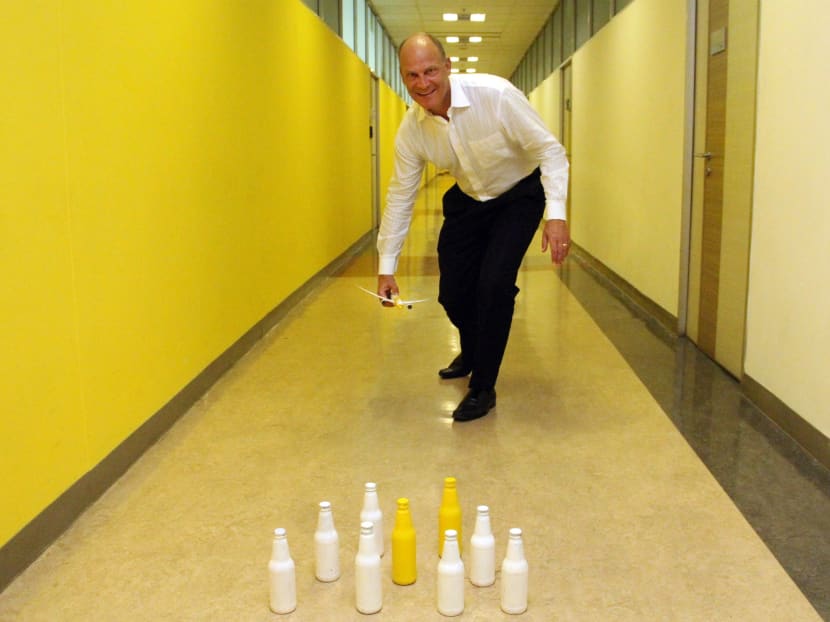Scoot to spread wings
SINGAPORE — Scoot, Singapore Airlines’ (SIA) medium to long-haul low-cost subsidiary, is set to take off with an ambitious growth plan to double seat capacity and increase route network by 50 per cent over the next 12 months.
SINGAPORE — Scoot, Singapore Airlines’ (SIA) medium to long-haul low-cost subsidiary, is set to take off with an ambitious growth plan to double seat capacity and increase route network by 50 per cent over the next 12 months.
For the first time, it is considering flying west to the Middle East and beyond — a proposition it has hitherto refrained from because of abundant opportunities in its dominant market largely comprising China, Japan, Taiwan, South Korea and Australia.
“The West is definitely on our cards. We are exploring some options at the moment. We haven’t yet finalised our decision on an announcement yet but it is not too far away. Our aircraft can fly non-stop up to London,” Scoot chief executive Campbell Wilson told TODAY.
Scoot’s eight-hour Singapore-Sydney flight is its longest at present.
“We might be a bit more niche when it comes to long-haul operations. It would not be immediate as there are lots of opportunities within Asia-Pacific, but it is not something we are closed to, especially as fuel prices stay benign,” he added, emphasising the airline’s business model focused on leisure travel on high-volume routes.
The airline aims to launch six to eight new destinations in the coming months, as well as increase frequencies on existing routes, largely to China. Scoot expects its Chinese network to roughly double in size from the current five destinations by the end of next year.
“We will shortly announce a new Chinese destination in October, new routes including the West in the first quarter of next year, besides the new Singapore-Melbourne flight in November,” Mr Wilson said.
In line with the expansion plans, Scoot is stepping up hiring, particularly for pilots and cabin crew. It expects its number of employees to grow to 1,000 from around 650 employees at present.
Scoot will have a fleet of 11 passenger jets comprising entirely Boeing 787 Dreamliners by next March as it completes the phasing out of the older Boeing 777 aircraft taken over from parent SIA. The new fleet will include a mix of 375-seat 787-9’s and 335-seat 787-8’s, and Scoot plans to expand the number of these jets to 20 by 2019.
“Having two types of aircraft helps better address the seasonality in demand,” Mr Wilson said.
Scoot currently operates a fleet comprising one Boeing 777, one 787-8 and five 787-9’s covering 15 destinations across seven countries including Singapore.
“From a cost-structure perspective, the single biggest benefit of converting to a Boeing 787 fleet is that these planes are about 20 per cent more fuel-efficient and fuel accounts for half our cost,” Mr Wilson said.
“Product enhancement is the other immediate benefit. From a revenue generation and distribution perspective, we are benefiting from the closer alignment with Tigerair. We are going to join our reservation systems together for even more seamlessness,” he added.
SIA, which fully owns Scoot, also owns 55.8 per cent of short-haul no-frills carrier Tigerair.
SilkAir is the group’s premium short to medium long-haul unit while SIA itself operates as the flagship premium long-haul carrier.
In a major integration initiative announced last year, Tigerair and Scoot will collaborate within the SIA group to tap the benefits of increased connectivity and greater customer reach, bringing in additional revenue at minimum incremental costs.
Between Scoot and Tigerair, the aim is to have a complementary network feeding transfer traffic into each other on the short to long haul routes. Some other key areas of collaboration between the airlines in the SIA group include the sharing of engineering services, fuel procurement, ground handling and corporate support services. Meanwhile, TigerAir and Scoot passengers can now also become members of SIA’s KrisFlyer frequent flyer programme.
With the integration on a fast-track mode, Mr Wilson indicated that Scoot is cruising closer to profitability.
“We are on an upward slope towards profitability … We see yield maturity building over time and we are observing that across our routes. In some cases like Australia, the yield maturity is offset by depreciation in Australian dollar versus the Singapore dollar. But on a local currency basis we see this steady,” he said.
SIA will announce its fiscal first-quarter group results tomorrow (July 29).
CORRECTION: An earlier version of this article said Scoot could possibly fly to London, as part of its growth plans. This is incorrect. Scoot's chief executive Campbell Wilson said its aircraft is able to fly as far as London, but did not say that Scoot was considering to fly there. We apologise for the error.







